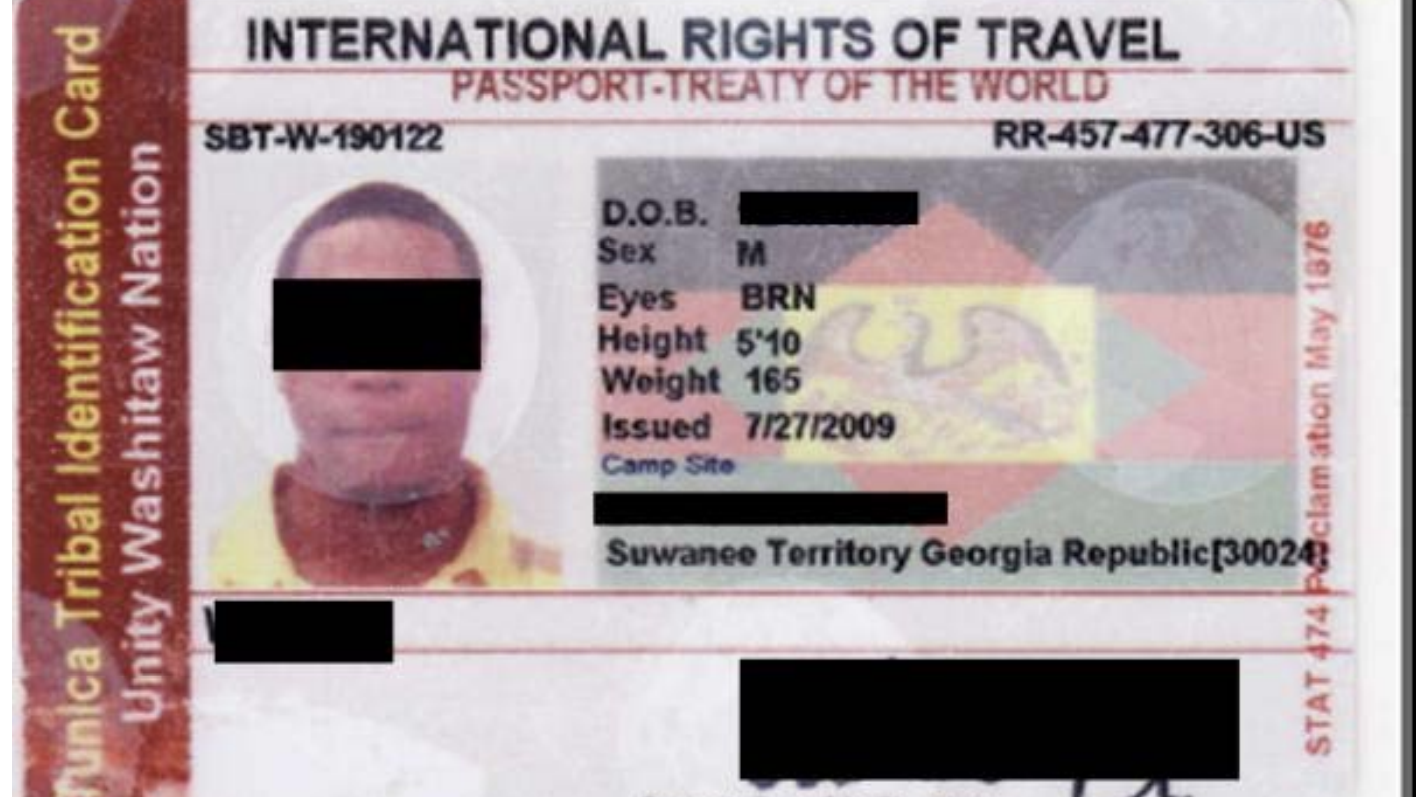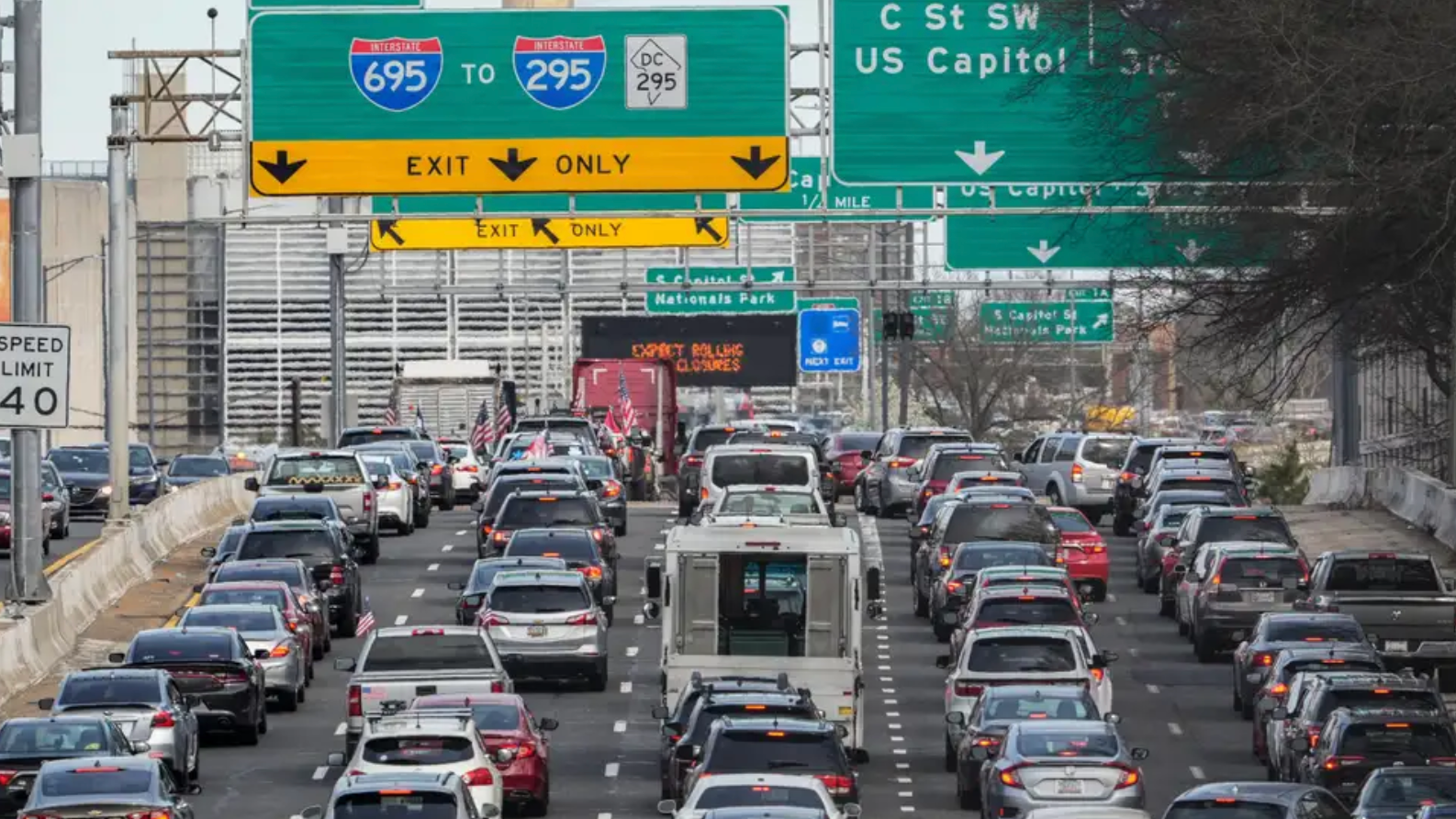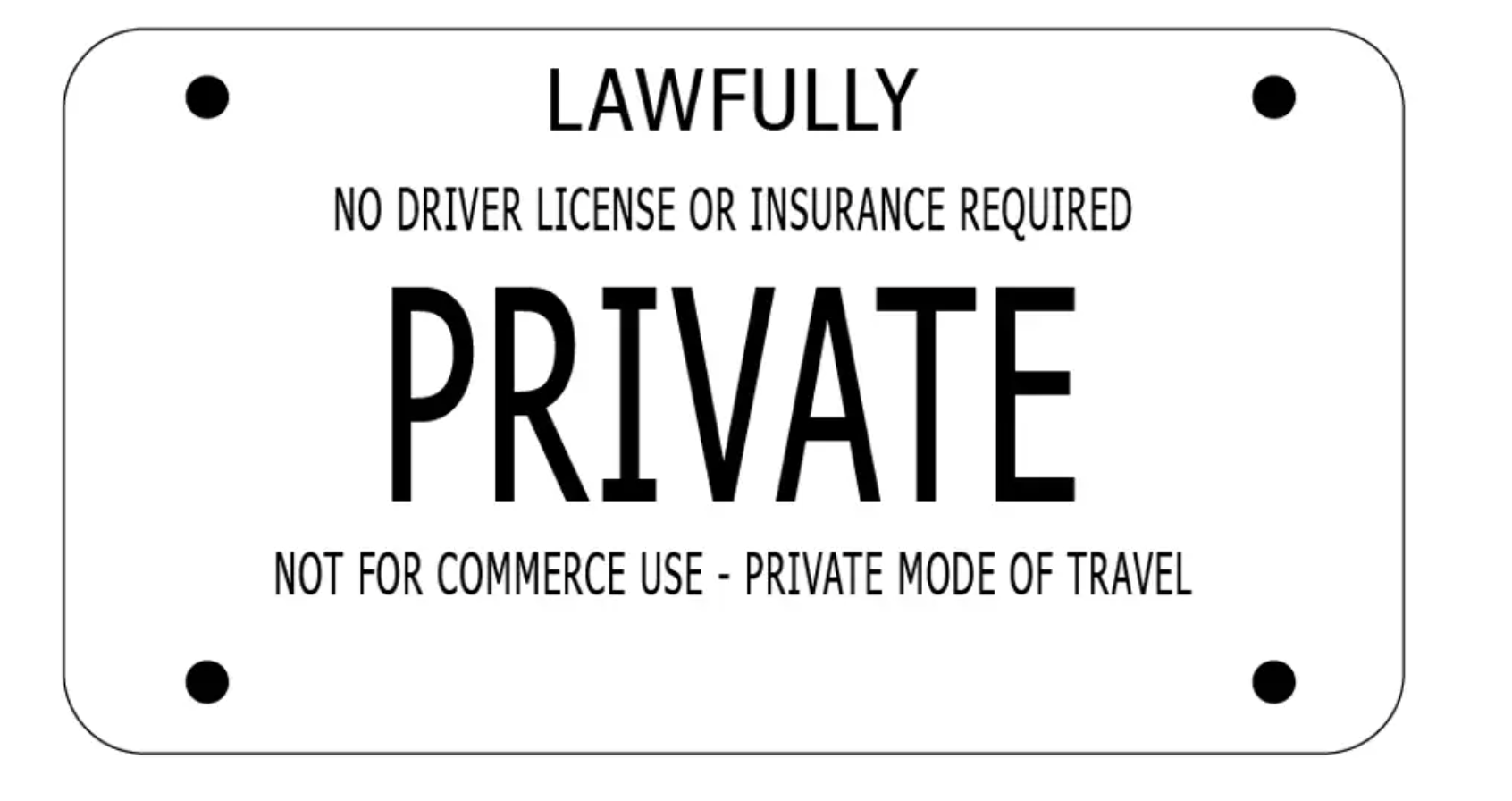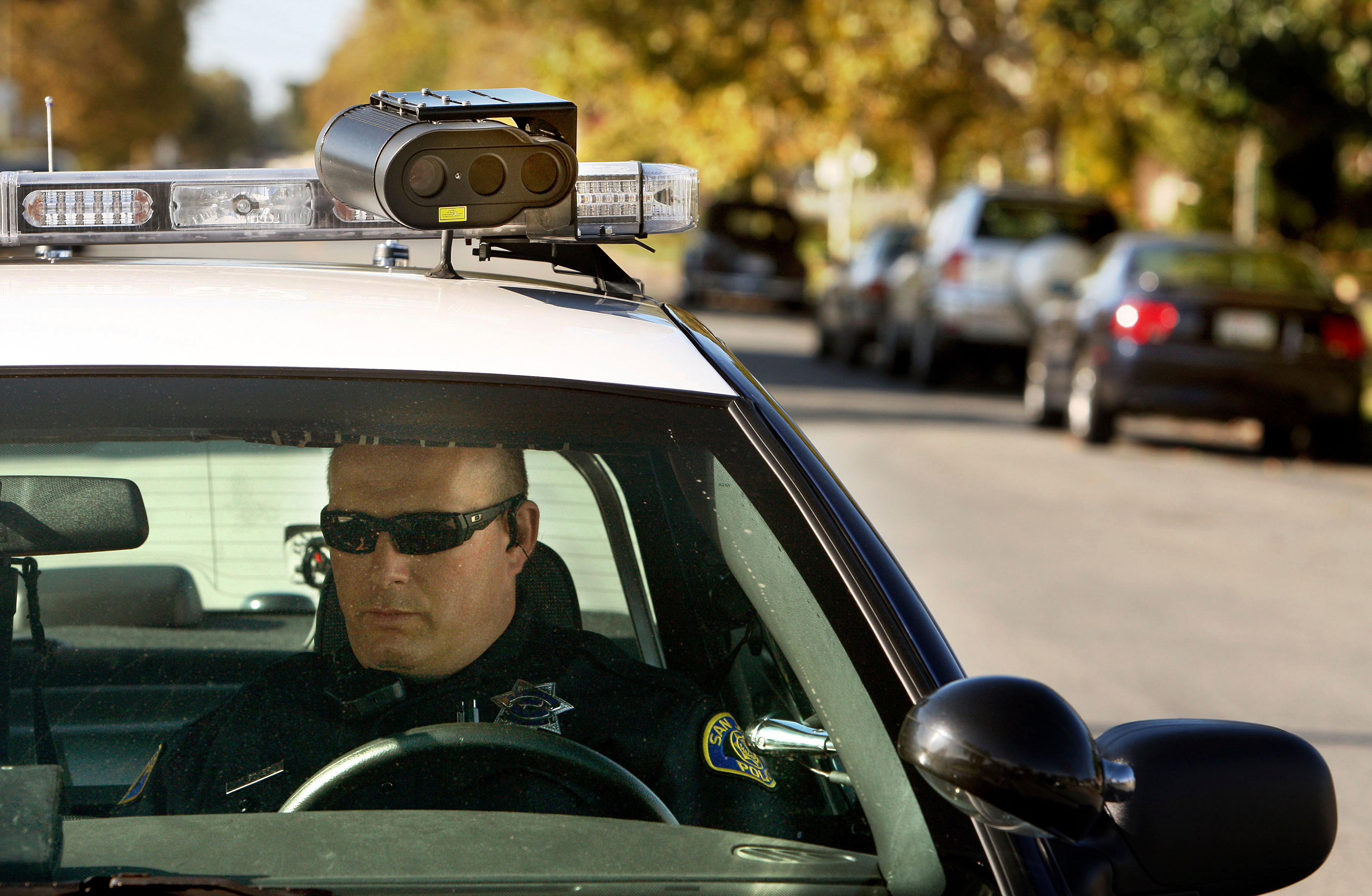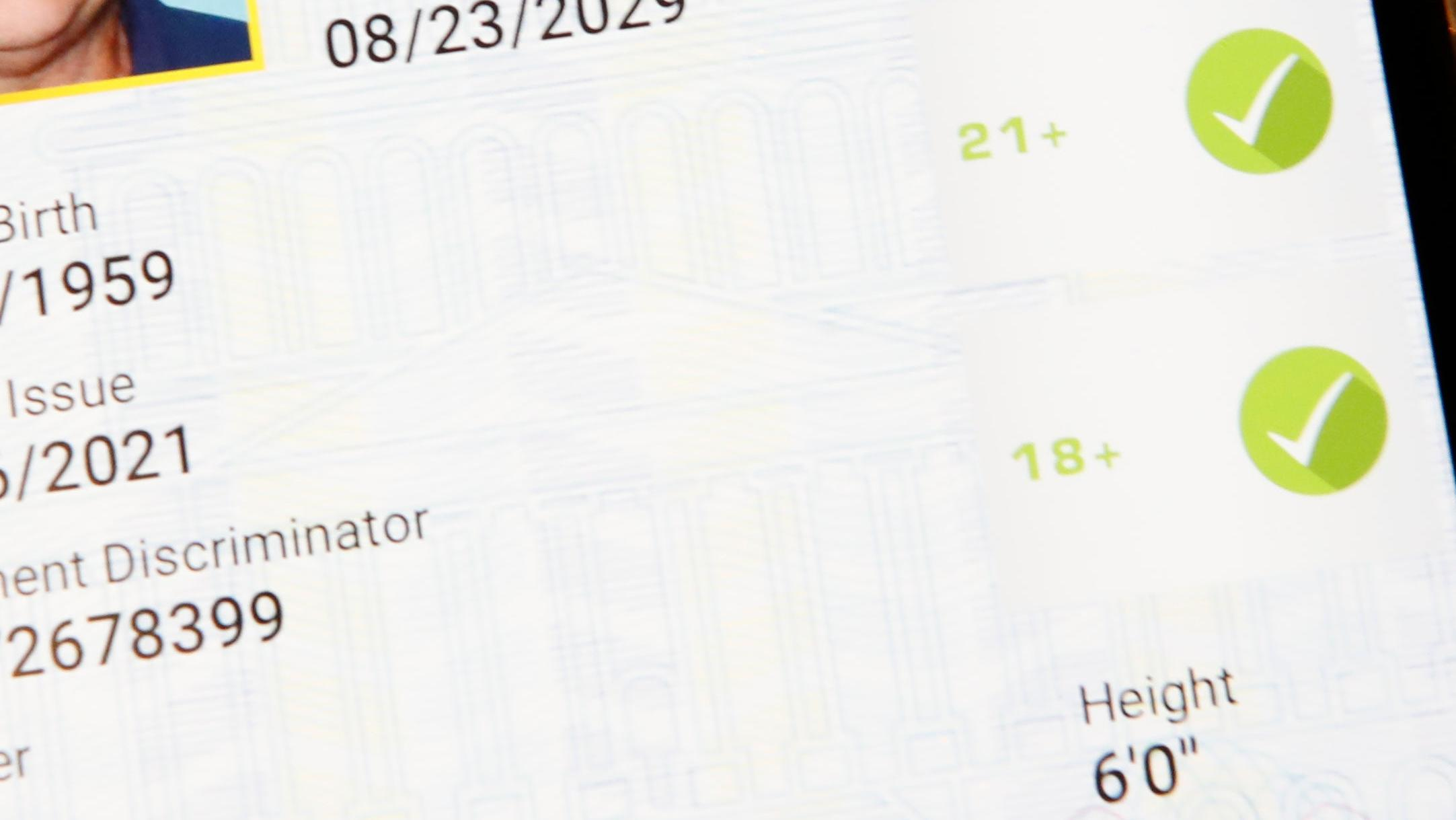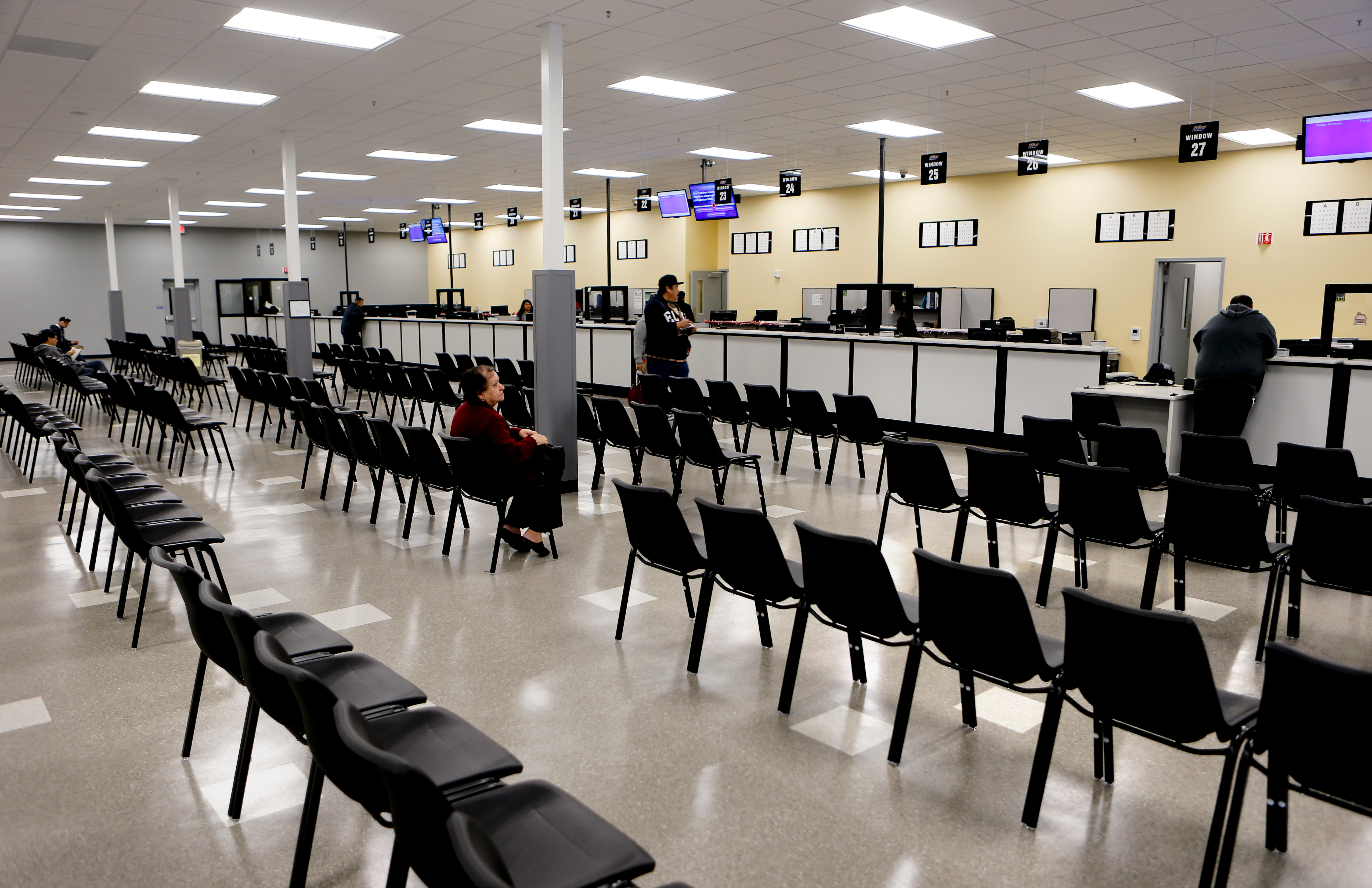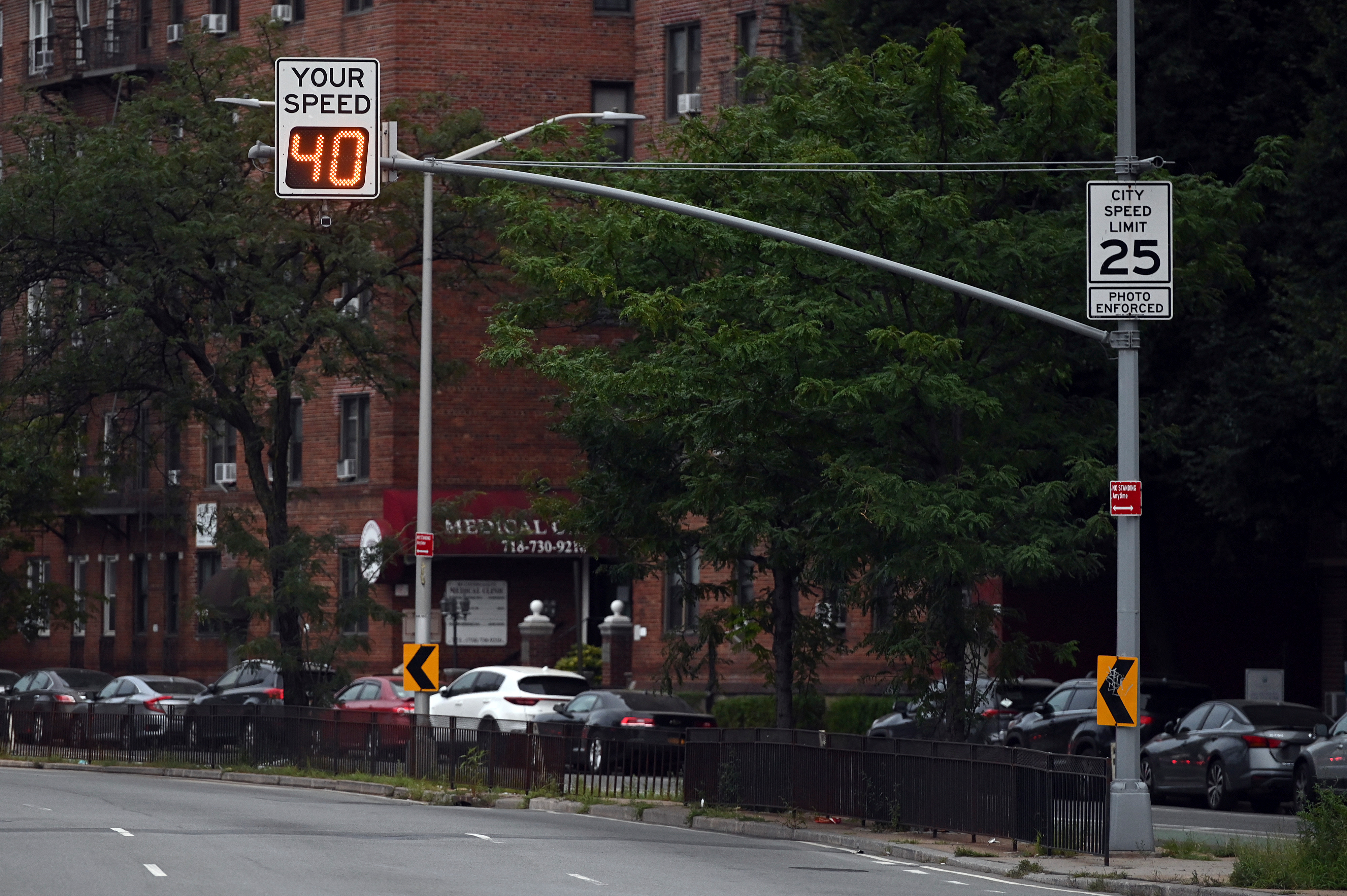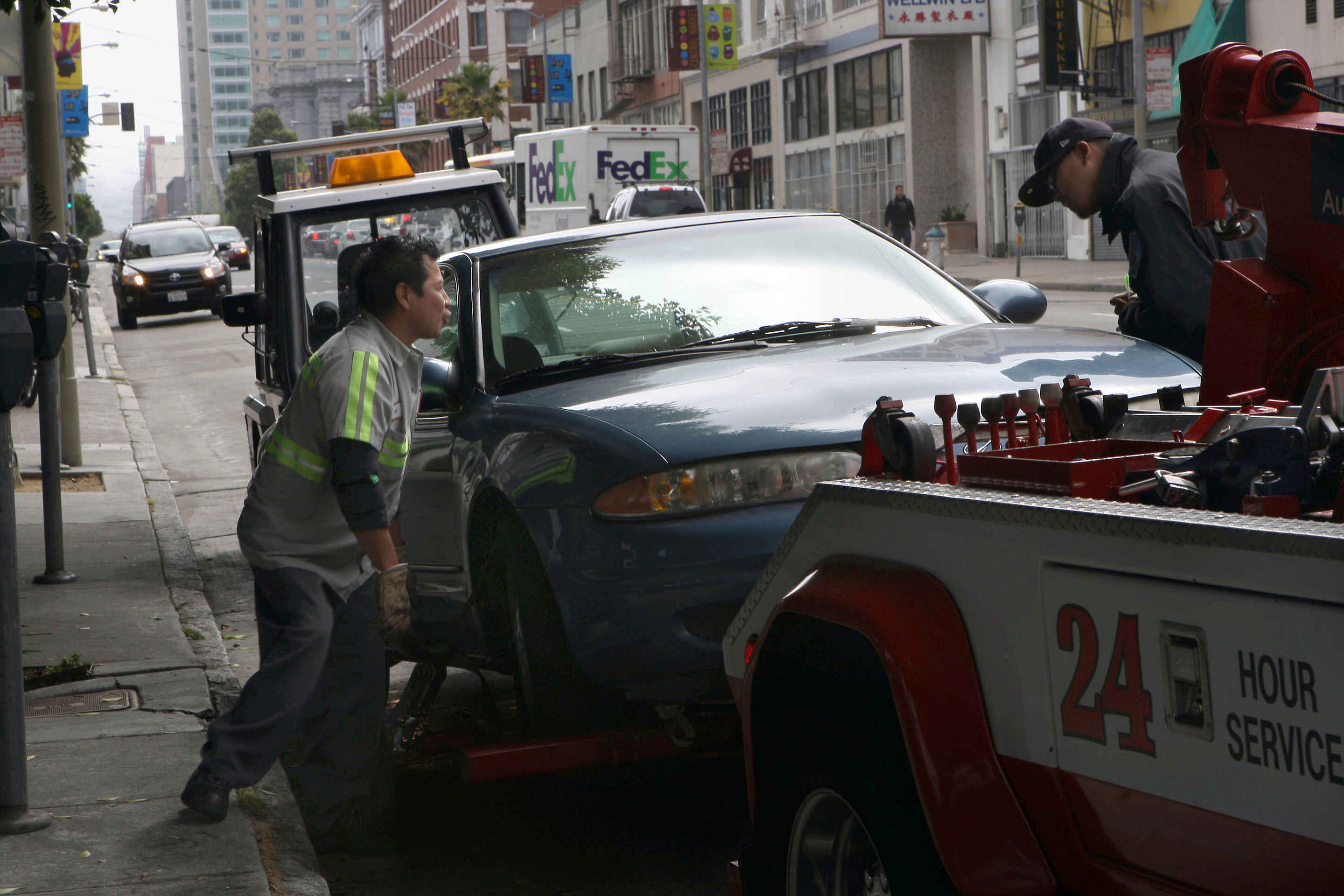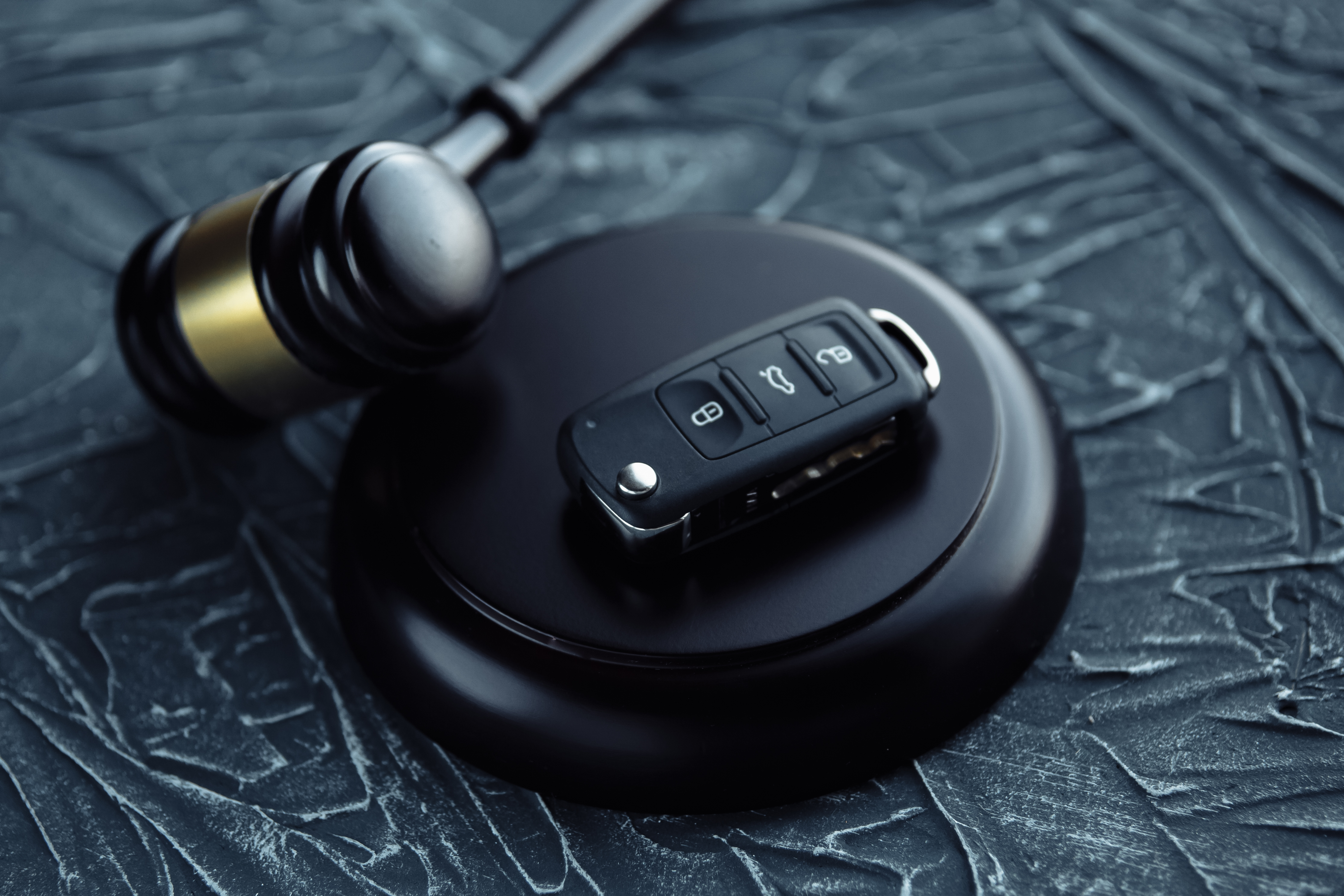Debunking The Nonsense That Sovereign Citizens Believe About Driving
'Sovereign citizens' believe they don't need a driver's license or a license plate. We look at their theories and examine why they don't add up.
(We are saying goodbye to 2023 by re-visiting our favorite posts from the last year. To see why we loved these stories, check out what we said about them here.)
You may have heard the term sovereign citizens popping up occasionally in the news and wondered, what's that all about? Well, it's a conspiracy theory, a way of life, a right-wing grift and a pain in the ass for everyone trying to have a society around them—all at once.
Sovereign citizens are a varied bunch. It's less an organization or ideology and more of a pick-your-adventure collection of philosophies all with the same idea: That the federal government isn't real (and hasn't been for years) and that shouting fake legal mumbo jumbo can you get out of everything from parking tickets to paying your taxes.
Since police most often make contact with citizens, sovereign and regular, via traffic stops, the philosophy has a great deal of bullshit surrounding cars, traffic and interacting with police during these stops. I've rounded up some of the sovereign citizen movement's more bizarre claims, and debunked each of them here.
Will it make a difference in how SCs think? Nope! But you may find this informative or, at the very least, fascinating, as I do. Just know one thing before you try any of these tactics: They do not work. In nearly 50 years, they have never worked.
But before we dive into the various tactics of a sovereign citizen during a traffic stop, we should define exactly who they are and what they generally believe.
What is a sovereign citizen?
The best way I can describe sovereign citizenry is to compare them with the Protestant Reformation. There's a holy book (the U.S. Constitution), and they think they have the right to interpret that book any way they want. They don't need priests (lawyers and judges) telling them what is or is not true.
However, our government does not work like the Catholic Church. The only folks able to interpret laws are judges, usually Supreme Court judges. That doesn't stop SCs from using law dictionaries, law books and various strands of gobbeldy-gook from claiming the benefits of U.S. citizenship with none of the responsibilities.
Sovereign Citizenry has its roots in the antisemitic, anti-tax, white supremacist Christian Identity movement known as the Posse Comitatus. Posse Comitatus members refused to recognize any law enforcement beyond the county sheriff. Its creators joined up with the Christian Identity movement and attempted to recruit disaffected rural American farmers during the American agricultural crisis of the late 1970s and early '80s.
"What the Posse did was put the DNA of its conspiracy theories and Christian Identity philosophy into the cell of the farm movement, which became the carrier for it," hate group expert Daniel Levitas told the Intelligence Report. Of course, a significant portion of the leaders of such groups were selling very expensive "legal advice" books and training programs generated by right-wing groups with a focus on how farmers could avoid bankruptcy, but with a lot of the SC philosophy we see today.
In short, the entire thing is, and was, a complete grift to take money from already desperate people.
Here's the FBI's general rundown of an SC:
Sovereign citizens believe the government is operating outside of its jurisdiction and generally do not recognize federal, state, or local laws, policies, or governmental regulations. They subscribe to a number of conspiracy theories, including a prevalent theory which states the United States Government (USG) became bankrupt and began using citizens as collateral in trade agreements with foreign governments. They believe secret bank accounts exist at the United States (US) Department of the Treasury. These accounts can be accessed using Internal Revenue Service (IRS), Universal Commercial Code (UCC), and fraudulent financial documents. Sovereign citizens are known to travel the country conducting training seminars on debt elimination schemes.
Some think this change in the U.S. government occurred with the ratification of the 14th amendment. SCs believe that amendment ended the existence of the United State as a country and turned it into a corporation capable of borrowing money against its very citizens — basically slavery but with extra steps. They believe most, if not all, courts are actually operating under Admiralty Law, and will point to gold fringe on U.S. flags in court rooms as proof.
Still others peg the dissolution of the U.S. to 1933, when the U.S. Treasury went off the gold standard, saying once again that the U.S. uses the "strawman" accounts to borrow against its citizens. From the FBI again:
Absent the gold standard, the USG needed "securities" to participate in global trade. Sovereign citizens believe the USG issued social security numbers and birth certificates as a means to register US citizens for use as collateral to be used in trade agreements with other countries. Under this system, the US Treasury Department creates an account for each citizen containing their monetary net worth. These accounts are commonly referred to as a "US Treasury Direct Account." The accounts are believed to contain tangible assets in amounts ranging from $630,000 to $300,000,000. Sovereign citizens refer to this as a "dollar value" or "credit." Sovereign citizens believe their "US Treasury Direct Accounts" are in the name of a third party created using their name. These third parties are referred to as "Stramineous Homo" (more commonly known as a "Strawman"), "corporate person," or "government entity." Sovereign citizens use the phrase "freeing money from the Strawman" to refer to extorting money from the US Treasury Department.
In order to reclaim your natural rights you must complete multiple complex steps to reject the federal government and the "strawman" version of your identity created when you entered the federal system at birth. This rejection includes things like sending your social security card back to the Social Security office and spelling your name in odd ways to separate you from the federal idea of your personhood as define through federal citizenship.
Sovereign citizen philosophy evolved from those racist, anti-tax and anti-government beginnings and is now a blanket term that covers multiple separatist views from the Black community's Moors to members of the Aryan Nation to simply unaffiliated anti-government libertarian extremists. The belief system is extremely decentralized — a person can subscribe to this philosophy as a member of an anti-government group or as an individual. Some are strict constitutionalists, some believe in "common law" or "natural law" as the highest set of rules they will submit to. The Southern Poverty Law Center estimates between 100,000 and 500,000 sovereign citizens live in the United States. The philosophy has caught on in other English-speaking countries as well, like Australia, Canada and the UK.
It's their beliefs and tactics that unite such disparate groups. Along with a willful misunderstanding of laws and the meanings of words, members of this group also engage in what the FBI calls "paper terrorism." SPLC has a good example:
Donna Lee Wray – the common-law wife of Jerry Kane, who was half of the team that killed the two police officers in West Memphis, Arkansas, in 2010 – was involved in a protracted legal battle in 2010 over having to pay a dog-licensing fee. She filed 10 sovereign documents in court over a two-month period and then declared victory when the harried prosecutor decided to drop the case. The battle was fought over a three-year dog license that costs just $20 in Pinellas County, Florida, where the sovereign lives.
A common them of this piece is going to be a lot of information on a worldview that is extremely fake.
Myth: I’m not driving, I’m traveling
One of the most basic tactics for SCs is quibbling over not just laws but the meaning of the words in those laws. SCs claim since they are not engaging in interstate commerce, they do not require a license or registration. This is why you'll often spot an SC's vehicle with a phony but official looking license plate with the language "Not for Hire" or "Private Conveyance." Because if they aren't engaging in commerce, they are not driving, but traveling. From A Legal Response to the Sovereign Citizen Movement:
First, Sovereign Citizens claim that "'to drive' is to go on the roads by a motorized conveyance doing business or being engaged in commerce, and it is a privilege. 'To travel,' on the other hand, is a right, and no legislation can be passed to strip you of your fundamental, inherent rights." Why does this matter? Because "[t]o state you are 'driving' is to unwittingly place yourself in admiralty or commercial jurisdiction[, and as] a sovereign being, you never need surrender your rights and exchange them for privileges."1
Get it? No? Good. That means the logic centers of your brain are still firing up.
Reality: Operating a motor vehicle on public roads
It's true, Americans have a right to travel enshrined in the Privileges and Immunities Clause of Article IV, Section 2 of the Constitution, which states "...citizens of each state shall be entitled to all privileges and immunities of citizens in the several states." It was meant to protect out-of-state Americans from being discriminated against as they travel from state to state, according to Cornell Law School.
The Supreme Court, the only people allowed to interpret U.S. law, have ruled on this matter as well. From A Legal Response:
In Hendrick v. State of Maryland, 272 the Supreme Court addressed the very right to travel (absent state regulation) that Sovereign Citizens seek to invoke.273 "[A] state may rightfully prescribe uniform regulations necessary for public safety and order in respect to the operation upon its highways of all motor vehicles, those moving in interstate commerce as well as others."274 Such regulations are "but an exercise of the police power uniformly recognized as belonging to the states and essential to the preservation of the health, safety, and comfort of their citizens."275 In later cases, the Court has repeatedly affirmed the states' power in this realm.276 Unfortunately for Sovereign Citizens, this binding interpretation confirms that a state may require a license, registration, or other documentation, regardless of whether the vehicle is used for commerce or private purposes.
SCs say that requiring a license for driving makes traveling without one illegal, and therefore would impinge on their right to travel freely. Simple!
However, the differences between "driving" and "traveling" that SCs agonize over are a pretty moot point, and it betrays a very basic misunderstanding of the wording of the law. What states administer licenses for is not traveling or driving — it's the operation of a motor vehicle. Take the Michigan Vehicle Code Act of 1949, which describes folks seeking a license as: "applicant for an operator's license or chauffeur's license to operate a noncommercial motor vehicle."
So you can hit the highways of the U.S on foot, on a horse or on a bike, but when you are piloting a two-ton vehicle, the state has an interest in protecting fellow drivers in traffic by require proper licensing.
Myth: I don’t need registration because this isn’t a car
The definition of what is a car, or vehicle even, is also up for grabs. From A Legal Response to the Sovereign Citizen Movement, which shows just how much bullshit these folks can come up with around what you probably thought were already agreed upon terms:
The terms "automobile" and "motor vehicle" denote special meaning. "The word 'automobile' connotes a pleasure vehicle designed for the transportation of persons on highways," and "is private property in use for private purposes." Whereas "motor vehicle" is defined in 18 U.S.C. § 31 as "every description of carriage or other contrivance propelled or drawn by mechanical power and used for commercial purposes on the highways in the transportation of passengers, passengers and property, or property or cargo."
Looking to these definitions, Sovereign Citizens deduce that "[c]learly, an automobile is private property in use for private purposes, while a motor vehicle is a machine which may be used upon the highways for trade, commerce, or hire." Moreover, "one who uses the road in the ordinary course of life and business for the purpose of travel and transportation is a traveler." As a non-commercial traveler using a private conveyance such as an automobile, Sovereign Citizens believe that one should not be required to obtain a license.
Many sovereign citizens will call their cars a "wagon" or a "conveyance" as there is no law requiring the registrations of conveyances. Eh? Eh? You buying it yet? Officer?
Reality: Car licensing and registration
This is another example of how SCs want all of the privileges of U.S. citizenship and none of the responsibilities. Those private vehicles or means of convayance or whatever are still driving on public roads and sharing those roads with other drivers. Those roads need to be maintained and plowed in the winter and those funds usually come straight from vehicle registrations. Ownership of private vehicles established through the state for ownership rights, not to mention car accident information. However any regulation of vehicles is considered an impediment to a SC's "right to travel."
Myth: Cops have no right to stop me, talk to me or detain me
The right to travel is so important that police have no right to impede that travel, via DUI checkpoints, border patrols or traffic stops. These are the folks that will repeat over and over to police through a crack in their window "Am I being detained?" when asked for license and registration. They may refuse to speak to the officer, hold a piece of paper to the window or request officers given them an "articulable reason" for the stop.
Because such stops are limiting the right to freely travel, police can't restrict or prove a hinderance to that travel in anyway. Speed limits, blood alcohol content tests and checkpoints are considered an unlawful tax or imposition on free travel.
This also applies to SCs who actually impersonate law enforcement officers as "county rangers," complete with fake law enforcement uniform and badge. So these are folks who think cops have no right to pull them over, but they have every right to pull over fellow citizens.
Reality: Traffic Stops
Having made it this far into the slideshow, you've probably already sussed out, the SCs are not correct. Sure, while in a perfect world a driver would be able to assert their rights and have those rights be respected, these are difficult arguments to make on the side of the road.
While in every state a police officer must have probable cause to pull you over, and they certainly do not always meet that level suspicion, the time to object to being pulled over is in a court room — not the side of the road. Legal objections to the cause of a traffic stop are usually performed following the stop, not before or during. The best way to deal with police is to politely answer their questions and then shut the fuck up if you're detained until a lawyer can be present. From the Legal Response to SCs:
In Delaware v. Prouse, the Supreme Court addressed whether police may pull over vehicles at random to check for a driver's license or registration absent probable cause. Holding that police may not, the Court stated: [E]xcept in those situations in which there is at least articulable and reasonable suspicion that a motorist is unlicensed or that an automobile is not registered, or that either the vehicle or an occupant is otherwise subject to seizure for violation of law, stopping an automobile and detaining the driver in order to check his driver's license and the registration of the automobile are unreasonable under the Fourth Amendment.290
[...]
But do police have to articulate their reasonable suspicion to the driver? In United States v. Sokolow, 292 the Supreme Court held that an officer "must be able to articulate something more than an inchoate and unparticularized suspicion or hunch. The Fourth Amendment requires some minimal level of objective justification for making the stop."293 Moreover, an investigative detention based on reasonable articulable detention must be temporary and last no longer than is necessary to effectuate the purpose of the stop.294 But the required articulation is reviewed only after the stop to determine whether the stop was justified.
Government overreach of citizen's rights is indeed a thing, but these folks do a disservice to those struggling to expand our rights via the system we all engage in.
As for DUI checkpoints, things get a little murkier from there. While some states do allow for checkpoints, other states consider such stops to be a violation of the Fourth Amendment's prohibition against illegal search and seizure. Only 11 states ban DUI checkpoints based on either previous legal challenges, rights defined by various state constitutions or the U.S. Constitution.
Myth: The state has no ability to license me
Many SCs don't even bother with a driver's license, as their existence implies the need for a license to travel freely, but some use their fancy, made-up legal bs to come up with their own form of license. Others might write "No Liability Accepted" above their signature on a driver's license to indicate they do not accept it as a legitimate identification document, according to the FBI.
Reality: Driver’s Licenses
This is another bit of strange alchemy. Unlike the fake license plates, which may fool fellow drivers most of the time, by the time you're showing someone a driver's license, they'll immediately know if it's fake or not. Having a clearly fake driver's license that declares you a natural citizen of North Carolina American Republic with the right to travel freely is just as good as having no driver's license at all.
While traveling is protected by the constitution, the state has an interested in making sure folks who operate a motor vehicle have been properly trained to do so.
Myth: Moving violations aren’t a crime — there’s no victim
This is a fun one. Because no laws or law enforcement can apply to SCs, any stop is an affront to their sacred right to travel. If they are caught doing something risky or driving in an unsafe manner, the will cite the Sixth Amendment which ensures Americans the ability to face their accusers (in court, of course.)
Reality: Traffic Violations
The police and the state have an interest in protecting the public. If an SC is driving in such a way that puts others at risk, police have to stop that driver before something tragic occurs. When it comes down to it, society doesn't work in such a way that the powers-that-be require your consent before being governed.
Myth: This traffic court has no jurisdiction over me
This is where things get really wild for the SC. They've been training for this moment, and they are going to directly stick it to the man. SCs have a lot of tactics to try to avoid consequences in court. Some will refuse to even enter the court room, shouting from the doorway that the court is invalid for a whole host of reasons; the favorite is the notion that Admiralty or Commercial law replaced common or natural law in the U.S. at some point. They claim a gold fringe on the edge of an American flag in the court room indicates that the court is operating under commercial or admiralty law. From A Legal Response:
This argument is based on the belief that the Constitution only contemplates three forms of law: "common law, equity (contract law) and Admiralty law."75 While Sovereign Citizens believe they are governed under common law (also known as "God's Law"), admiralty law is actually the "King's Law" and subjects an unwitting party to the federal government's jurisdiction.76 So why does the type of flag matter? According to Sovereign Citizens, "[f]ederal territorial law is evidenced by the Executive Branch's Admiralty flag (a federal flag with a gold or yellow fringe on it) . . . ."77 This admiralty flag, with its gold fringe, is evidence that the federal government declared martial law and sought to establish courts with complete control.
They will engage in "paper terrorism," filing frivolous motions with little or no basis in reality. Here's a few according to the FBI:
A notice of copyright as to the person's name, often labeled "Common Law Copyright Notice."
"Registered Warrant Claim for Trust Special Deposit."
Filings responding to traffic tickets or other charges labeling those documents as "abandoned paperwork" and demanding that the court official respond with authentication of authority, a certified copy of the official's oath, a certified copy of the officials "Bar Bond", and so on.
A response to a traffic ticket or other charge labeled as an "Affidavit of Specific Negative Averment, Opportunity to Cure, and Counterclaim."
I could go into what all of those are attempting to mean, but let's face it, neither you nor I would benefit from such an exercise.
Reality: Court Appearances
As much as a pain in the ass SCs are during traffic stops, getting them into court can be just as daunting. The good news is for everyone else is that these tactics don't work. Sure they can wear down a police officer on the side of the road or tie up the courts for months, but in the end none of these pseudo legalese ramblings will prevent the fine from being issued and indeed may lead to more loss of freedoms. Several January 6 defendants attempted to use SC arguments in court and ended up with bail denied and just as stiff prison sentences.
Myth: That’s not me on court documents — that’s a strawman
SCs believe that a "strawman" was created for them at birth when their parents registered their birth certificates, or when they were issued a social security cards. They differentiate this strawman from themselves with the spelling of their names. In their world, documents which contain their names in all capital letters are meant for a strawman who represents them — not the individual themselves.
SCs believe they can go through a process of reclaiming their sovereignty by sending these documents back to the federal government. Once these items are received, the secretary of state will issue a Apostille number.
An Apostille is a document that indicates the government has recognized the filed document as a true copy. Once a SC gets an Apostille number however, they use it as proof that they are beholden only the "natural law" or "common law" and have severed ties with the U.S. government.
To differentiate, SCs will often refer to themselves as a representative for their strawman by using strange name spellings with odd grammatical flourishes. Joe Smith becomes Smith: Family of, Joe. The names can get quite involved, with copyright marks or disclaimers about limited liability added. This strawman also has money in a U.S. Treasury account, which the U.S. is able to use as collateral to borrow from international banks. By reclaiming their sovereignty, SCs supposedly have access to these funds, and will use them to try to borrow money or satisfy debts or fines issued by the courts. So when you receive a ticket, if it names your strawman as the one in trouble, you're fine because that's not you.
Because going to court means a. American courts have no jurisdiction over a SC and b. engaging in legal activities could risk an SC making another artificial contract with the government they generally do their best to avoid going to court. If it's unavoidable, it's their duty to challenge the validity of the court, making it a huge hassle the entire way.
Reality: Citizenship
It will likely not shock you to learn that courts do not look too kindly on these actions. Wasting a court's time with your made up legal mumbo jumbo is a good way to get in more trouble than you were before. None of this stuff matter as you do not get to choose if you are a citizen of this country and what that means. From A Legal Response:
Section 1, clause 1, of the Fourteenth Amendment, the "Citizenship Clause," states that "All persons born or naturalized in the United States, and subject to the jurisdiction thereof, are citizens of the United States and of the State wherein they reside." In United States v. Wong Kim Ark, 183 the Supreme Court examined this clause and its implications for children born in the United States to foreign parents.184 The Court noted that "it is beyond doubt that, before . . . the adoption of the [Fourteenth Amendment], all white persons, at least, born within the sovereignty of the United States . . . were native-born citizens of the United States."185 The Citizenship Clause's "main purpose doubtless was . . . to put it beyond doubt that all blacks, as well as whites, born or naturalized within the jurisdiction of the United States, are citizens of the United States
[...]
The Court also addressed any "distinction between citizenship of the United States and citizenship of a state," stating that "it is only necessary that he should be born or naturalized in the United States to be a citizen of the Union" but state citizenship requires federal citizenship and residence.188 In other words, while a person's state citizenship is dependent on residency, "every citizen of a state is ipso facto a citizen of the United States."189 But what is a citizen of the United States? Is it a fictional corporate entity as believed by Sovereign Citizens? The answer is clear: a citizen for purposes of the Fourteenth Amendment's Citizenship Clause is the actual, physical person born or naturalized in the United States.
Well you've made it this far. Are you a better, wiser person for clicking through these slides? Nope! But it is fascinating to look at folks living in realities parallel to our own.
